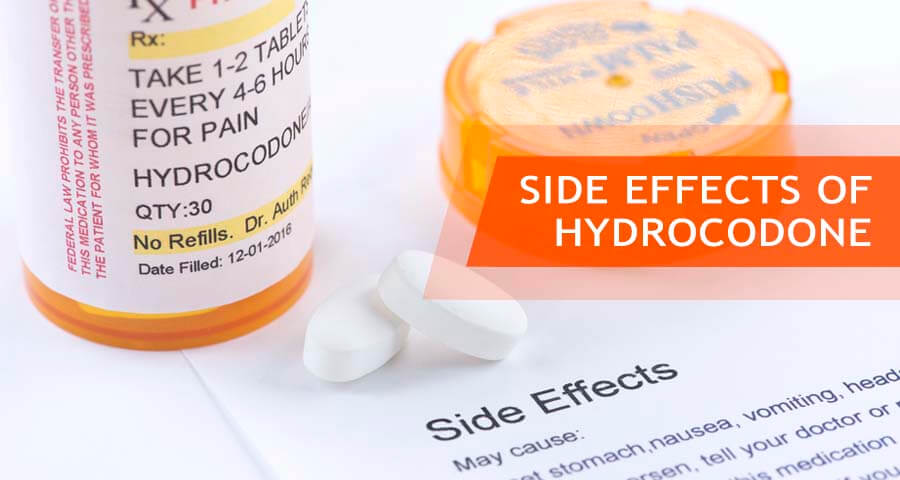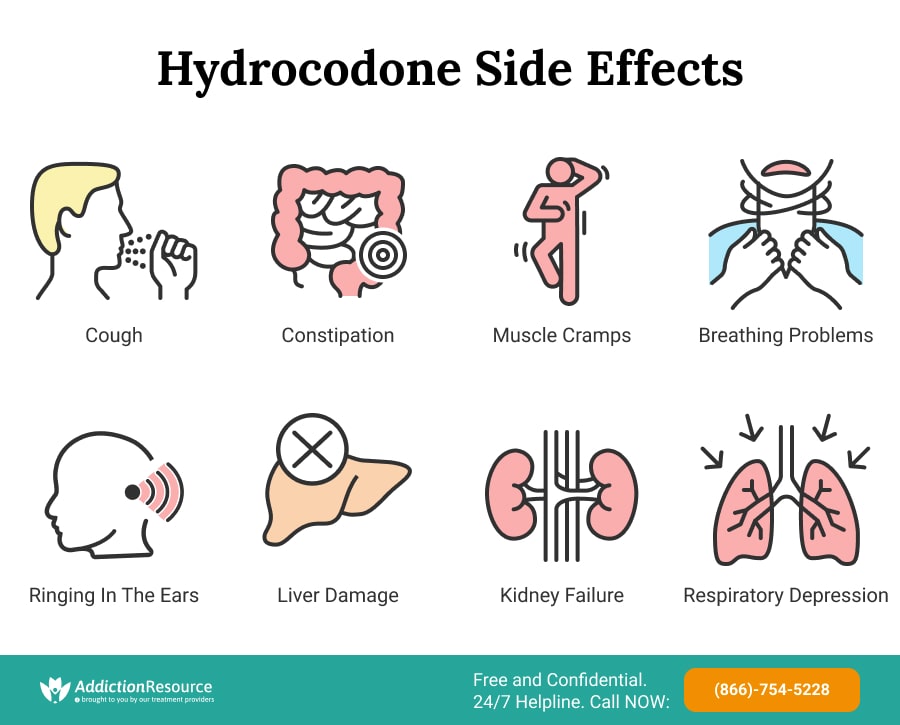
Hydrocodone, an opioid medicine, is prescribed for severe pain and to suppress a dry cough. Although this drug is currently available by prescription only, unfortunately, its use can still cause hydrocodone side effects even when consumed upon medical advice. Breathing problems, constipation, fever – all these side effects of hydrocodone can provide more discomfort than relief. Moreover, drug abuse can result in an unintentional overdose, just because one has taken a larger dose or mixed it with alcohol, without being aware of the health risks.
Table Of Contents:
Note that abusing the drug in any amount may cause significant harm to one’s health.
Short-Term Side Effects of Hydrocodone
When comparing this opioid with the other prescription painkillers, they appear to have relatively similar side effects. Speaking about Tramadol vs. Hydrocodone, for example, the adverse reactions are quite similar; however, the latter is much more efficient in pain relief.
The Short-Term Hydrocodone Side Effects Include:
- Breathing problems
- Cough
- Chest discomfort
- Congested nose or nasal discharge
- Fever, chills, and excessive weakness
- Depressive thoughts
- Swollen limbs or face
- Frequent or painful urination
- Headache
- Constipation
- Ringing in the ears
- Dizziness and nausea
- Sleepiness
- Muscle cramp
- Allergic skin reactions which include itching, rash, and hives

Long-Term Hydrocodone Side Effects
If one continues using the medicine for a long time, its influence on one’s health becomes more serious. The long-term hydrocodone effects are immense when compared to immediate reactions.
Long-Term Adverse Health Reactions Include:
- Hearing loss: Prolonged use of this drug may result in a profound irreversible hearing loss.
- Chronic Constipation: This side effect starts to occur as soon as a person starts taking the medicine; however, prolonged use develops this side effect making it a constant problem.
- Liver damage: This side effect is more likely to occur if the opioid is taken in combination with acetaminophen and can be quite severe. Contact the doctor immediately if one has noticed yellowing of the skin and eyes whites or experiences pain in the right upper stomach.
- Kidney Failure: Large doses of drugs can also result in kidney diseases, especially when combined with other medications.
- Cardiovascular Damage: This drug may affect the heart health and blood vessels. Note that CVD is one of the leading causes of death globally.
- Brain Damage: Personality change, memory loss, and difficulties with cognition are the symptoms of opioid-induced brain damage.
- Androgen deficiency: Chronic use of this opioid affects the level of male sex hormones in the body, which is dangerous for both men and women.
- Pregnancy problems: The intake of this drug while pregnant is likely to harm the fetus and might result in NAS.
- Severe respiratory depression: Breathing problems is one of the most dangerous hydrocodone effects as it may lead to coma and even death.
- Serotonin syndrome: This potentially lethal effect may be caused by taking high doses of the medicine or combining it with serotonergic -MAOIs or SSRIs, for example.
Variables Affecting the Side Effect Emergence
Not everyone who takes the drug will experience all of the above-mentioned effects. They will also vary in severity. Some users can just have a headache, while others can suffer more dangerous side effects of hydrocodone. All of this is influenced by certain factors, including:
Combining with other substances
Mixing Hydrocodone and alcohol, marijuana, other prescription medications, or street drugs increase the likelihood and severity of hydrocodone effects. Although some people believe that mixing it with weed is a safe combination, it may still have severe adverse reactions, including overdose.
Route of administration
The type of intake or potentiation can contribute to the side effects of hydrocodone. There’s no denying the positive effects of pain relief, and many people attempt to potentiate them by snorting the drug. This will produce a stronger effect, but the effects of snorting are not limited to that. They also include nasal congestion, damages to the sinus, respiratory problems during sleep, and hypersensitivity pneumonitis.

Injecting or smoking the drug can cause one to OD even with a lower dose because it is metabolized faster this way.
Individual tolerance and conditions
Some people are more likely to develop certain hydrocodone side effects, such as nausea or itching, due to existing health conditions, for example, allergies. Many people have no tolerance to acetaminophen, which can intensify side effects and cause serious health risks.
Hydrocodone Overdose
Hydrocodone overdose can be very likely, especially among school-aged children. According to the Monitoring the Future Report of 2013, 1.4%, 4.6%, and 5.3% of 8th, 10th, and 12th graders, respectively, used it recreationally in the form of Vicodin in the past year.
Generally, adults are prescribed from 5 mg to 10 mg per day. The Hydrocodone overdose corresponds to approximately 90 mg. However, not everyone who takes 90 mg will necessarily be at risk, especially if they have developed tolerance from abusing it for a long time. What is more, the amount needed to overdose depends on how the drug is taken.
Signs and Symptoms of Hydrocodone overdose
Misuse of the medication or ignoring dangerous interactions, such as with alcohol or other drugs, can lead to an overdose. Opioid overdose can lead to death because of its effects on the brain’s parts that regulate breathing.
The Symptoms Of Hydrocodone Overdose Are:
- Pinpoint pupils
- Unconsciousness
- Difficulties with breathing
- Cold, clammy skin
- Confusion
- Nausea and vomiting
- Low blood pressure
- Spasms of the stomach and intestines
The Hydrocodone overdose can range from an hour to a few hours depending on the amount taken and other individual factors. Death is rare, but it is possible due to extremely slowed breathing. A huge dose is needed to produce toxic effects if taken orally.
Dangers of Overdose
A hospital stay may be required for more doses of the medication that reverses the drug’s effects. Long-term effects are rare if there are no complications, but if there are, these may cause permanent disability. Among them are pneumonia, brain damage from lack of oxygen, muscle damage from lying down for an extended period of time, liver failure, bradycardia (heart slowness), cardiac arrest, coma, respiratory depression, seizures, and even death.
There is a high price to pay for abusing this drug, going way above and beyond the monetary cost.
OD Response
- If someone overdoses on the opioid, seek medical help right away.
- Reach a local poison control center directly by calling 1-800-222-1222, the national toll-free Poison Help hotline, from anywhere in the country. This hotline number will connect with poisoning experts, who will provide further instructions.
- Don't try to get the person to throw up unless the experts or a healthcare provider give instructions.
- Follow the poisoning expert instructions thoroughly and stay with an overdosed person until the emergency care service arrives.
Help In Avoiding Adverse Reactions
Some of the side effects of hydrocodone listed above are quite severe and may require medical assistance, switching to an alternative drug, or quitting the medication. Ask for professional help to cope with the body’s adverse reactions to the drug.

If one is just about to start taking the medication, it’s vital to be well informed about the risks and do their best to avoid hydrocodone side effects and overdose.
Below Are Some Precautionary Measures That One Should Take Before Start Using It:
- Inform the doctor and/or pharmacist if one is allergic to any medicine, as there are some combination products, like hydrocodone and acetaminophen.
- Discuss with the medical professional if one experiences any condition indicated in the Important Warning section of the tablet leaflet/packet.
- The consulting doctor should know what herbal and medical products are being previously or currently consumed.
- Inform the doctor about being pregnant, planning pregnancy, or breastfeeding as hydrocodone stays in the system for some time after the last dose and might affect the fetus.
- Inform the doctor about opioid use before any surgery planned (including dental surgeries).
- Be careful when getting up too quickly from a lying down position as this drug may cause dizziness and weakness.
- Pay attention both to correct storage and expiration dates as the expired drug intake can have unpredictable consequences.
- Consult a specialist immediately in case of any of the symptoms of skin allergy.
Hydrocodone treatment can be very beneficial to manage pain, but less so when one makes a habit of seeking solace in it. There is a fine line between using an opioid prescribed by a doctor to manage physical pain and live a normal life and using it to manage an emotional response to pain. The latter creates a risk of abuse and addiction, and if this is the case, treatment for substance abuse apart from pain treatment will be necessary.
Frequently Asked Questions
Does hydrocodone make you sleepy?
Yes, drowsiness is one of the side effects of the drug.
Is it safe to take hydrocodone while pregnant?
Taking hydrocodone or other opioids is not recommended during pregnancy, as it may lead to miscarriage, neonatal abstinence syndrome (NAS), various congenital disabilities, and preterm delivery. Always consult your doctor if you are pregnant or planning it so that the medical professional can prescribe another medication for pain management.
Does hydrocodone make you constipated?
Yes, one of the side effects of hydrocodone and other opioids is constipation. It happens because opioids can slow down stool movement through the digestive system. Around 41% of patients taking opioids for chronic pain are likely to suffer from this side effect.
Hope Without Commitment
Find the best treatment options. Call our free and confidential helpline
Most private insurances accepted
Find Drug Rehabilitation Centers Near You Anywhere In the US
Addiction Resource team has compiled an extensive list of the top drug rehabilitation facilities around the country. Use our locator tool to find the best centers near you.
Page Sources
- Drug Enforcement Administration. Hydrocodone. 2018. https://www.deadiversion.usdoj.gov/drug_chem_info/hydrocodone.pdf
- Medline Plus. Hydrocodone. 2019. https://medlineplus.gov/druginfo/meds/a614045.html.
- National Institute of Health. HYDROCODONE. 2019. https://www.ncbi.nlm.nih.gov/books/NBK548700/
- NIDA, Monitoring the Future Survey, Overview of Findings 2013. https://archives.drugabuse.gov/monitoring-future-survey-overview-findings-2013
- U.S. National Library of medicine, Poison control center - emergency number. https://medlineplus.gov/ency/article/002724.htm
- R A Friedman, J W House, W M Luxford, S Gherini, D Mills, Profound hearing loss associated with hydrocodone/acetaminophen abuse, 2000. https://pubmed.ncbi.nlm.nih.gov/10733182/
- U.S. Food and Drug Administration, Acetaminophen: Avoiding Liver Injury, 2009. https://www.fda.gov/consumers/consumer-updates/acetaminophen-avoiding-liver-injury
- U.S. Food and Drug Administration, FDA Drug Safety Communication: FDA warns about several safety issues with opioid pain medicines; requires label changes. https://www.fda.gov/media/96472/download
- Lakshmi Kant Pathak, and Vimala Vijayaraghavan, Hydrocodone snorting leading to hypersensitivity pneumonitis, 2016. https://www.ncbi.nlm.nih.gov/pmc/articles/PMC4900771/
- U.S. National Library of medicine, Hydrocodone and acetaminophen overdose, https://medlineplus.gov/ency/article/002670.htm
- World Health Organization, Opioid Overdose, 2020. https://www.who.int/news-room/fact-sheets/detail/opioid-overdose
- Harvard Health Publishing, Common causes of constipation, https://www.health.harvard.edu/diseases-and-conditions/common-causes-of-constipation
- U.S. National Library of medicine, Pregnancy and Opioids, https://medlineplus.gov/pregnancyandopioids.html


 Reviewed by:
Reviewed by:  Written by:
Written by: 

 FindTreatment.gov
FindTreatment.gov